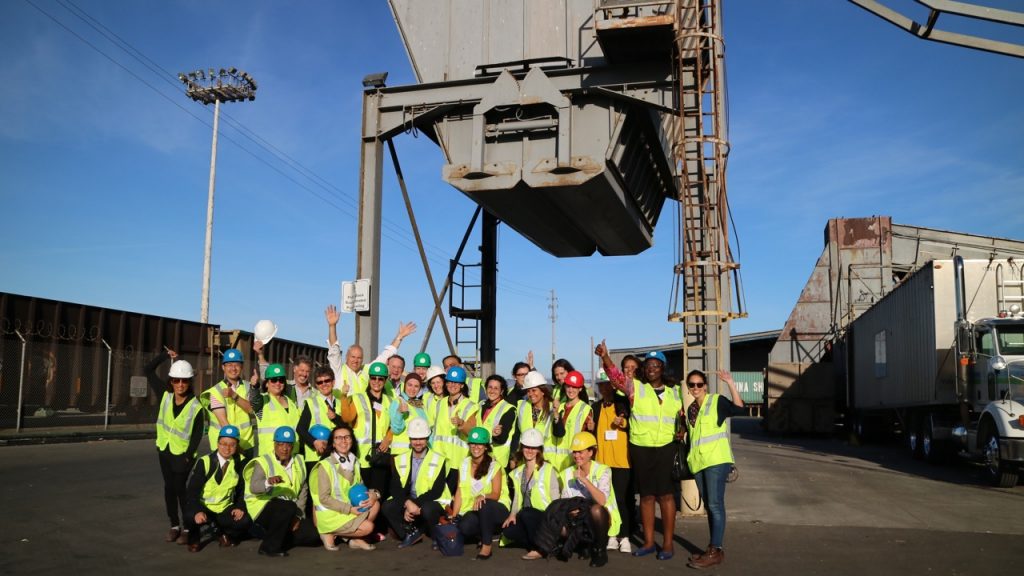Our Cities, Our Climate Exchange Advances Local Climate Action

Cities around the world are facing unique challenges as they confront the realities of climate change, yet their motivations for building low-carbon sustainable futures are the same. The way in which locals leaders take action on bold climate measures is an opportunity for cities to learn from one another. That’s why the U.S. Department of State and Bloomberg Philanthropies convened the second Our Cities, Our Climate exchange this year, hosting 17 urban sustainability directors from 16 countries to participate in collaborative sessions in three U.S. cities: San Francisco, California; Austin, Texas; and Washington, D.C.
This month, the world watched as the Paris Agreement reached the needed threshold to enter into force this year, and on October 5 – just as this exciting news broke – exchange participants began to arrive in the U.S. for this year’s program. During the course of the 10-day exchange, participants met with U.S. leaders in the sustainability field, toured innovative sustainability centers, and learned from each other through interactive group sessions.
Starting in San Francisco, home to some of the most innovative climate technologies and practices in the world, participants examined solid waste management, transportation practices, and community engagement strategies. San Francisco is committed to a bold climate action plan that prioritizes working towards zero waste, 50 percent clean transportation (half of all trips by bus or bike), and 100 percent renewable energy. This vision requires strong city coordination, bold solutions, and an inclusive community engagement plan. Participants met with city officials and toured facilities that are working to make this plan a reality.
In Austin, participants heard directly from Mayor Steve Adler on how the city is growing its economy and population, while also working to make a low-carbon future a reality. Our Cities, Our Climate participants toured the Mueller District, a 700-acre airport redevelopment community, to learn how Austin’s sustainable building requirements are being put into action. At Mueller, participants dug into the operations of the sustainable community with visits to one of the first LEED-certified hospitals and a LEED-certified grocery store. The group also visited Pecan Street Labs, a local research institute working to identify the best technical solutions to climate change.
While in Austin, the sustainability directors joined fellow innovators and environmental leaders at SXSW Eco. A panel session with U.S. Special Envoy for Climate Change Jonathan Pershing and Mayor Adler, as well as three Our Cities, Our Climate sustainability directors, allowed the panelists to share the role of cities in this broader global effort and how this exchange is inspiring global urban leaders.
Making a final stop in Washington, D.C., participants met with U.S. governmental leaders working on energy and environmental policy, and learned about the steps being taken within the nation’s capital.
Washington, D.C. is leading by example through Climate Ready DC, an adaptation plan that works across sectors to identify and curb the current and future impacts of climate change on the District’s infrastructure, facilities, and communities.
Participants also examined climate resilience and water management by touring the DC Water campus and Yards Park, a mixed-use space that combines residential and commercial development with green infrastructure, energy efficiency, and other climate strategies that contribute to the resilience and vitality of the surrounding neighborhood. Additionally, both the U.S. Department of State and The White House hosted the participants for discussion on how the U.S. government is working to support local leaders in their efforts to fight climate change.
Throughout the course of the exchange, participants saw firsthand that ambitious climate targets can be realized in every city around the world. Innovations are happening in every sector, and by working together to connect goals to solutions, more cities can adopt these new, efficient strategies as they develop their own climate action plans. The world is now looking toward successful implementation of the Paris Agreement, and Our Cities, Our Climate demonstrates the power of city collaboration and importance of local leadership to this effort.